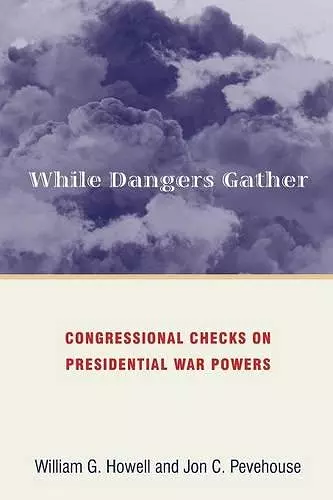While Dangers Gather
Congressional Checks on Presidential War Powers
William G Howell author Jon Pevehouse author
Format:Paperback
Publisher:Princeton University Press
Published:7th Sep '07
Should be back in stock very soon

This is the state-of-the-art book on the domestic and international politics of the use of military force abroad by U.S. presidents. It should be widely read for the depth and breadth of its scholarship, and for the importance of its topic. -- Bruce Russett, Yale University This is probably the best book yet on the domestic politics of American decisions to use military force. Through an astonishing array of empirical data, it presents convincing evidence that the history of American military action during the postwar era would have looked quite different without congressional restraints. The authors weave three bodies of research--political communication, executive-legislative politics, and the international relations literature on the use of force--into a single coherent, causal story, and their language is quite lucid and jargon-free. -- Benjamin O. Fordham, Binghamton University This is an important book that scholars will have to take seriously. The authors' persuasive assertions that Congress is a serious constraint on presidential power are bold and sure to ignite debate. While other scholars have begun to tread on the conventional wisdom, none have done such a comprehensive job in making the claim and supporting it with such a variety of evidence. -- Linda L. Fowler, Dartmouth College
Offers evidence on Congress' influence on presidential war powers. This book concludes that presidents are systematically less likely to exercise military force when their partisan opponents retain control of Congress.Nearly five hundred times in the past century, American presidents have deployed the nation's military abroad, on missions ranging from embassy evacuations to full-scale wars. The question of whether Congress has effectively limited the president's power to do so has generally met with a resounding "no." In While Dangers Gather, William Howell and Jon Pevehouse reach a very different conclusion. The authors--one an American politics scholar, the other an international relations scholar--provide the most comprehensive and compelling evidence to date on Congress's influence on presidential war powers. Their findings have profound implications for contemporary debates about war, presidential power, and Congress's constitutional obligations. While devoting special attention to the 2003 invasion of Iraq, this book systematically analyzes the last half-century of U.S. military policy. Among its conclusions: Presidents are systematically less likely to exercise military force when their partisan opponents retain control of Congress. The partisan composition of Congress, however, matters most for proposed deployments that are larger in size and directed at less strategically important locales. Moreover, congressional influence is often achieved not through bold legislative action but through public posturing--engaging the media, raising public concerns, and stirring domestic and international doubt about the United States' resolve to see a fight through to the end.
Co-Winner of the 2008 Richard E. Neustadt Award, Presidency Research Section of the American Political Science Association Winner of the 2007 D. B. Hardeman Prize, Lyndon Baines Johnson Foundation "[The authors] argue that when it comes to 'wars of choice,' Congress's partisan composition influences whether the U.S. sends troops abroad, how likely the nation is to respond to a foreign crisis with force, and how long the decision to respond takes...To understand how Congress wields its influence during the lead-up to war, Howell surveyed the range of congressional actions--hearings, investigations, nonbinding resolutions, public criticisms. In the final section of the book, he connect[s] those activities to foreign-affairs media coverage."--Laura Stuart, Chicago Magazine "Howell and Pevehouse's research is an excellent addition to a stream of literature that has left woefully unconsidered the effects of domestic politics in general and the institution of Congress in particular on the international relations process... Their book shows that Congress can, and apparently does, have substantial effects on how the president crafts foreign policy. Future scholars would be well advised to continue to walk down the path paved by this well crafted addition to the American foreign policy literature."--Walt Jatkowski, APSA Booknotes "Taken in its entirety, the outstanding scholarship presented in While Dangers Gather offers critical insight into the domestic politics of war and provides an interesting case in favor of divided government as an apparent check on presidents' proclivity to engage in war."--Jeffrey S. Peake, Presidential Studies Quarterly "The book is refreshingly straightforward in presentation."--Michael D. Ramsey, Review of Politics
- Winner of Lyndon Baines Johnson Library D. B. Hardeman Prize 2007
- Joint winner of American Sociological Association Presidency Research Section Richard E. Neustadt Book Award 2008
ISBN: 9780691134628
Dimensions: unknown
Weight: 482g
384 pages